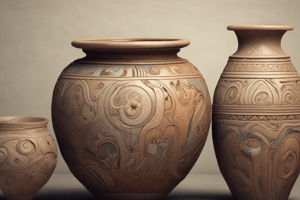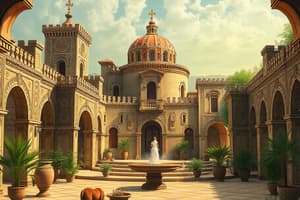Podcast
Questions and Answers
Objects made from clay are called ______, a term derived from the Greek word 'keramos'.
Objects made from clay are called ______, a term derived from the Greek word 'keramos'.
ceramics
Firing clay at approximately $1200°C$ transforms it into ______, a more robust ceramic.
Firing clay at approximately $1200°C$ transforms it into ______, a more robust ceramic.
stoneware
Baking clay at extremely high temperatures alters its ______, rendering it nearly indestructible.
Baking clay at extremely high temperatures alters its ______, rendering it nearly indestructible.
structure
Early potters sometimes coated the inside of woven baskets with clay to enable them to ______.
Early potters sometimes coated the inside of woven baskets with clay to enable them to ______.
Early potters embellished their works by ______ the surface of the soft clay to create patterns and designs.
Early potters embellished their works by ______ the surface of the soft clay to create patterns and designs.
[Blank], a special type of paint, was used to make clay objects smooth, glossy, and colorful.
[Blank], a special type of paint, was used to make clay objects smooth, glossy, and colorful.
The people of the Greek island of ______ were creating their own pottery decorated with designs and images of animals by 3,500 years ago.
The people of the Greek island of ______ were creating their own pottery decorated with designs and images of animals by 3,500 years ago.
The pottery makers of ______ were the first to learn to make porcelain.
The pottery makers of ______ were the first to learn to make porcelain.
[Blank] is the most delicate and fragile type of pottery.
[Blank] is the most delicate and fragile type of pottery.
For many years, European potters attempted to replicate Chinese ______, but it was not until 1710 that they succeeded.
For many years, European potters attempted to replicate Chinese ______, but it was not until 1710 that they succeeded.
The most ancient ______ in our possession were made out of clay.
The most ancient ______ in our possession were made out of clay.
Much of what is known about past cultures has been learned by studying clay dishes and ______.
Much of what is known about past cultures has been learned by studying clay dishes and ______.
Ceramics are divided into many different kinds based on the type of ______ used and how it is fired.
Ceramics are divided into many different kinds based on the type of ______ used and how it is fired.
To make pottery, clay is typically fired at about ______ degrees Celsius.
To make pottery, clay is typically fired at about ______ degrees Celsius.
When white clay is fired at an even higher temperature, it becomes ______.
When white clay is fired at an even higher temperature, it becomes ______.
The art of making ______ developed in many places around the world.
The art of making ______ developed in many places around the world.
Archeologists think that early potters in China may have covered the inside of woven baskets with clay so that the baskets would ______.
Archeologists think that early potters in China may have covered the inside of woven baskets with clay so that the baskets would ______.
When the baskets were either placed on a fire or left there by mistake, the fire turned the baskets into hard, ______ pots.
When the baskets were either placed on a fire or left there by mistake, the fire turned the baskets into hard, ______ pots.
The ______ were already decorating their pottery with colors and designs.
The ______ were already decorating their pottery with colors and designs.
If you hold a piece of porcelain up in the air, ______ will shine through it.
If you hold a piece of porcelain up in the air, ______ will shine through it.
Flashcards
Artifacts
Artifacts
Human-made objects of historical interest
Ceramics
Ceramics
Objects made from clay
Common types of ceramics
Common types of ceramics
Pottery, stoneware, and porcelain
Pottery
Pottery
Signup and view all the flashcards
Stoneware
Stoneware
Signup and view all the flashcards
Porcelain
Porcelain
Signup and view all the flashcards
Baking clay at high temperatures
Baking clay at high temperatures
Signup and view all the flashcards
Early pottery origins
Early pottery origins
Signup and view all the flashcards
Pottery decoration
Pottery decoration
Signup and view all the flashcards
Porcelain
Porcelain
Signup and view all the flashcards
Who first made porcelain?
Who first made porcelain?
Signup and view all the flashcards
Study Notes
- Most ancient artifacts were made of clay thousands of years ago
- Studying clay dishes and figures helps us understand past cultures
- Few items made from other materials have survived as well as clay items
Terminology
- Objects made from clay are called ceramics
- The word "ceramics" comes from the Greek word keramos, meaning "potter's clay"
Types of Ceramics
- Ceramics are divided based on the type of clay and how it's fired
- Common types of ceramics are:
- Pottery
- Stoneware
- Porcelain
- Pottery is made by firing clay at about 500°C
- Stoneware is made by firing clay at about 1200°C
- Porcelain is made by firing white clay at an even higher temperature
- Baking clay at high temperatures changes its structure
- The change in structure makes it permanently hard and almost indestructible
History
- Pottery developed in many places worldwide
- Early pottery may have originated from strengthening woven baskets with clay
- Archeologists believe early Chinese potters covered baskets with clay to hold water
- When baskets were placed on fire, the grass burned away, leaving hard, durable pots
Decoration
- Early potters globally decorated their work to make it attractive
- Decoration techniques:
- Scratching the surface of soft clay for designs
- Using glazes like special paints to make objects smooth, shiny, and colorful
- The Egyptians decorated their pottery with colors and designs
Pottery in the Mediterranean
- Pottery styles began to spread around the Mediterranean region about 5,000 years ago
- By 3,500 years ago, people on the Greek island of Crete made pottery decorated with designs and animals
- These ancient designs have survived for thousands of years and are seen in ancient Greek art
Porcelain
- Chinese pottery makers were the first to learn to make porcelain
- Porcelain is the finest and most fragile type of pottery
- Light shines through porcelain
- The Chinese exported porcelain to Europe, where it was highly valued
- European potters tried to copy Chinese porcelain for many years
- It was not until 1710 that a German succeeded in producing porcelain
Studying That Suits You
Use AI to generate personalized quizzes and flashcards to suit your learning preferences.




